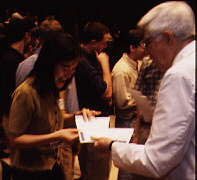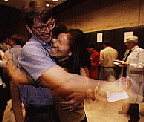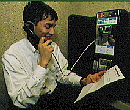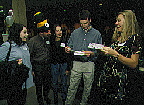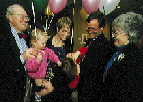
|
Family
affairs
David Cook and wife Jennifer sit off to the
side on a sofa, each trying to balance a plate of food on
one knee, a child on the other. While 5-month-old Nathaneal
seems content to sit still on Mommy's lap, 3-year-old Emily
is getting a little fidgety on Daddy's.
David's residency interviews have taken
him all over the country these past few months. Jennifer
went with him on the first few, then decided it would be a
whole lot easier--and less expensive--if she just stayed
home with the kids. "I promised her a new couch with the
money we would have used," he says, laughing. She
smiles.
Moments later, brunch forgotten, the young
family is inside Turner Auditorium, jubilantly locked in a
group hug. David's internal medicine residency, it turns
out, will take them all to the Mayo Clinic in Minnesota--
much closer to their home state of Idaho than they are
now.
Says David ecstatically, "We already have
a realtor!"
|
|
Kristin Chally and Brooks Stewart just flew in yesterday from a
Colorado ski trip; tomorrow they're off on a 10-day vacation to
the Virgin Islands, and then Chally will head to Taiwan for six
weeks of training in infectious disease and traditional Chinese
medicine. They are a peripatetic couple--throughout the winter
they rarely spent more than a single night in a single city.
Their exhausting round of residency interviews took them to two
dozen medical centers, from Florida to California to Boston --
"more than anyone else in the class," says Chally, her nose
sunburned from the ski slopes. The two aren't married; they
aren't even engaged, yet. Nevertheless they decided to "couples
match"--that is, tie their individual outcomes inextricably
together. Unlike several other couples in the class, who would be
content to be at hospitals in the same city or region, Chally and
Stewart are matching to be in the same hospital in the same
specialty: emergency medicine. That's the reason they went on so
many interviews, and have ranked 15 programs on their list. "The
odds," says Chally, "are definitely against us."
WHILE THE NATIONAL RESIDENT MATCHING PROGRAM has been around
since 1952, the logistics have been streamlined over the last
three years thanks to ERAS--the electronic residency application
service. This year, 90 percent of all medical specialties take
part in the national program; by next year, nearly every
specialty will be linked, says H. Franklin Herlong, the kindly,
bespectacled associate dean of student affairs. He has shepherded
Hopkins medical students through the stomach-churning match
process since 1989.
In the late summer of their fourth year, medical students in most
specialties fill out a standard residency application, which can
then be zapped electronically (along with their transcript and
letters of recommendation) to residency programs across the
country. Herlong advises most students to apply to 10 to 20
programs--more for those applying to specialties with few spots
(like orthopedics, dermatology, or plastic surgery) and for the
handful of students each year who apply as couples.
The residency programs then spend time sifting through their
applicant pool to decide whom they'd like to invite for an
interview. If you aren't invited for an interview, you stand no
chance of getting a spot. The competition can be intense. The
most prestigious programs at the most prestigous hospitals (where
Hopkins students tend to set their sights) routinely get
thousands of applications--and interview several hundred
applicants--for two dozen residency spots.
Once the interview notices begin trickling in, the strategizing
starts. While some programs send out invitations a month or two
in advance, others give just a few days' notice. And all the
interviewing is done during a finite period--mostly between early
December and late January. "On the weekends of January 9 and
January 16, it seemed like every place wanted to interview then,"
says Jonathan Gerber, who received invitations from 23
orthopedics programs. As a result of the scheduling crunch, says
Gerber, students frequently "have to pick and choose among great
programs."
Money can also be a limiting factor, since hospitals expect
applicants to foot the bill themselves for all their travel and
accommodations (with rare exceptions). "I have a lot of friends
who live in different cities; that saved us on hotel costs. And
we did drive a lot," says Chally, who did the marathon hospital
tour with boyfriend Stewart.
The residency interview, say those who've gone through it, is
similar to a first date--a chance for both the applicant and the
program's faculty and chief residents to put their best face
forward and to see if personalities click. Gerber, who ended up
interviewing at seven programs (among them Penn, Yale, and Boston
University), found the process grueling. Programs typically
interviewed dozens of people a day, he says. "Some fell terribly
behind, then they'd rush through the later interviews." At
Harvard, the interview gauntlet took him to five rooms, each with
a different panel of faculty, department heads, and/or
residents.
Stewart says he's glad he took three months off from school to
interview with Chally at more than two dozen hospitals. "The
interviewing process itself helps you figure out what you want,"
he says. "I was asking different questions by the end than I was
at the beginning."
|

